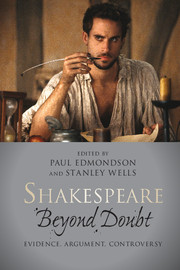Book contents
- Frontmatter
- Content
- List of illustrations
- List of contributors
- General introduction
- Part I Sceptics
- Part II Shakespeare as author
- 6 Theorizing Shakespeare's authorship
- 7 Allusions to Shakespeare to 1642
- 8 Shakespeare as collaborator
- 9 Authorship and the evidence of stylometrics
- 10 What does textual evidence reveal about the author?
- 11 Shakespeare and Warwickshire
- 12 Shakespeare and school
- 13 Shakespeare tells lies
- Part III A cultural phenomenon: Did Shakespeare write Shakespeare?
- Afterword
- A selected reading list
- Notes
- Index
6 - Theorizing Shakespeare's authorship
from Part II - Shakespeare as author
Published online by Cambridge University Press: 05 April 2013
- Frontmatter
- Content
- List of illustrations
- List of contributors
- General introduction
- Part I Sceptics
- Part II Shakespeare as author
- 6 Theorizing Shakespeare's authorship
- 7 Allusions to Shakespeare to 1642
- 8 Shakespeare as collaborator
- 9 Authorship and the evidence of stylometrics
- 10 What does textual evidence reveal about the author?
- 11 Shakespeare and Warwickshire
- 12 Shakespeare and school
- 13 Shakespeare tells lies
- Part III A cultural phenomenon: Did Shakespeare write Shakespeare?
- Afterword
- A selected reading list
- Notes
- Index
Summary
There are two types of problems in attributing works to authors, consistent over time, but especially acute in the late sixteenth and early seventeenth centuries. First, we do not often have much information about people, making it hard for us to reconstruct what they were like and so to decide whether they actually wrote what has been attributed to them. All too often decisions are made based on the assumption that a particular work could or could not have been written by someone because it bears no resemblance to the purported author of that work. Second, looking at the problem from the other way round, attributions are not always precise, safe or even made at all, so we often do not know whether we can assume that a work was really written by the author we think is responsible. And this is before we deal with more philosophical problems of authorship and the attribution of an author to such common sentences as ‘I love you’; ‘Hear your good father, lady’; or, ‘I have forgotten my umbrella.’ In theorizing Shakespeare's authorship we need to consider both sides of the question, before drawing to a conclusion. The evidence will demonstrate, I think, that what we do not know is often much more significant than what we do know and any case that we make about authorship has to consider ignorance as well as knowledge.
It is often argued that the gaps in our understanding of Shakespeare's life are particularly unusual. In an online blog discussion about the authorship question, William Rubinstein asked what looks like a series of pointed questions to his opponents:
No evidence exists as to how or why Shakespeare came to London, what his real religion was, how he became so erudite and learned although he had no formal education past the age of about 13, why he retired to a provincial town in his mid-40s, etc., etc., only stories and legends recorded long after his death. Not a single new important fact about Shakespeare's life has been discovered since the Mountjoy-Bellot lawsuit in 1910, and nothing whatever about his supposed career as a writer. Doesn't this strike you as peculiar?
- Type
- Chapter
- Information
- Shakespeare beyond DoubtEvidence, Argument, Controversy, pp. 63 - 72Publisher: Cambridge University PressPrint publication year: 2013



